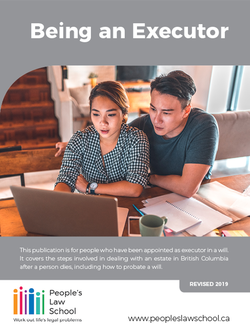Difference between revisions of "Being an Executor"
Drew Jackson (talk | contribs) |
Drew Jackson (talk | contribs) |
||
| Line 28: | Line 28: | ||
[[File:Creativecommonssmall.png|link=Clicklaw Wikibooks Copyright Guide|alt=Creative Commons Attribution-NonCommercial-ShareAlike 2.5 Canada Licence]] ''Being an Executor'' © People’s Law School is, except for the images, licensed under a Creative Commons [[Clicklaw Wikibooks Copyright Guide|Attribution-NonCommercial-ShareAlike 2.5 Canada Licence]]. | [[File:Creativecommonssmall.png|link=Clicklaw Wikibooks Copyright Guide|alt=Creative Commons Attribution-NonCommercial-ShareAlike 2.5 Canada Licence]] ''Being an Executor'' © People’s Law School is, except for the images, licensed under a Creative Commons [[Clicklaw Wikibooks Copyright Guide|Attribution-NonCommercial-ShareAlike 2.5 Canada Licence]]. | ||
We believe accurate, plain English information can help people take action to work out their legal problems. This information explains in a general way the law that applies in British Columbia. It is not intended as legal advice. For help with a specific legal problem, contact a legal professional. Some sources of legal help are highlighted in the "[[Where to Get Help for Being an Executor|Where to Get Help]]" section. | |||
== People's Law School== | == People's Law School== | ||
Revision as of 17:16, 27 January 2017
|
|
This is a Clicklaw Wikibook, a collaborative, plain language legal publication that is updated as a wiki and can be printed or downloaded. |
|
|
Download the full Wikibook in PDF. |
|
|
Download the full Wikibook in EPUB (learn more). |
|
|
Buy this Wikibook and get it by mail. |
|
|
Customize: take what you need, leave the rest (learn more). |
Being an Executor, from People's Law School, is for people who have been appointed as executor in a will. It covers the steps involved in British Columbia in dealing with an estate after a person dies, including the procedure to probate the will. The information reflects the Wills, Estates and Succession Act, which became law in 2014.
Contents
- Ten Steps to Being an Executor
- Step 1. Locate the will · Step 2. Confirm the validity of the will · Step 3. Protect the assets · Step 4. Arrange the funeral · Step 5. Communicate with beneficiaries · Step 6. List the assets & liabilities · Step 7. Apply for probate · Step 8. Deal with debts & taxes · Step 9. Account to beneficiaries · Step 10. Distribute the estate
- Resources
- About
Copyright & Disclaimer
![]() Being an Executor © People’s Law School is, except for the images, licensed under a Creative Commons Attribution-NonCommercial-ShareAlike 2.5 Canada Licence.
Being an Executor © People’s Law School is, except for the images, licensed under a Creative Commons Attribution-NonCommercial-ShareAlike 2.5 Canada Licence.
We believe accurate, plain English information can help people take action to work out their legal problems. This information explains in a general way the law that applies in British Columbia. It is not intended as legal advice. For help with a specific legal problem, contact a legal professional. Some sources of legal help are highlighted in the "Where to Get Help" section.
People's Law School

People's Law School is a non-profit society in British Columbia providing free education and information on the legal problems of daily life.
